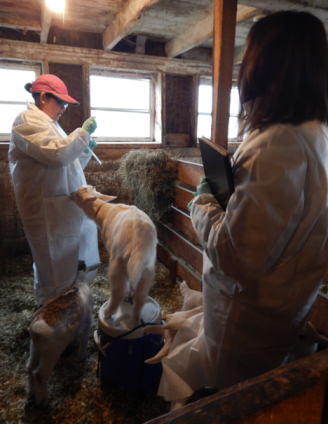Alumni Reflections

As part of her Laboratory Leadership Service training, Dr. Mercante (left) was part of a CDC Epi-Aid team that assisted with an E.coli O157 outbreak investigation at a goat farm in rural Connecticut.
Alexandra Mercante completed her PhD in 2011. Her path to the Laney Graduate School’s Microbiology and Molecular Genetics (MMG) doctoral program, however, was an interesting one that found her “in” the MMG program before she was actually a Laney student.
“Before graduate school, I was working as a research technician in the microbiology lab of another MMG professor, Dr. Charles P. Moran. As a research technician I was able to collaborate with MMG graduate students, and they always spoke in a positive manner about the Laney Graduate School and their training, so when it was time for me to apply to graduate school the choice was easy.”
At Laney, Mercante’s research focused on how the sexually transmitted bacterial pathogen Neisseria gonorrheae turns genes on and off in order to develop resistance to antibiotics, which impacts the way that Neisseria gonorrheae can survive and cause disease inside humans. “I was always interested in bacterial pathogens that had a big impact on public health. Initially I considered HIV research, but my heart was always in microbiology. In addition, I knew through discussions with other Laney Graduate School students that Dr. William Shafer was an excellent mentor so that also compelled me to do my graduate research in his laboratory.”
Today, Mercante is at the U.S. Centers for Disease Control and Prevention. She recently completed the Laboratory Leadership Service (LLS) fellowship program, a two-year training program that prepares early-career laboratory scientists to become future public health laboratory leaders. “As an LLS Fellow in the Enteric Diseases Laboratory Branch, I have led various laboratory safety and quality systems projects and activities that have benefited the branch in many ways. In addition to my laboratory systems work, I also serve as a health communications liaison, which allows me the opportunity to translate and disseminate the impactful scientific work that we do to a broad audience.”
In the busy years since her time at Laney, Mercante has carved out time to stay connected and give back to the Laney Graduate School. She has served as a panelist in the Pathways Beyond the Professoriate series, which brings LGS alumni back to campus to discuss their professional pathways beyond Emory. She has participated as a guest scientist in the Laney Network Exchange, an annual event where LGS students meet and network with LGS alumni from a variety of professional sectors. She is a seminars committee member in Laney’s Graduate Division of Biological and Biomedical Sciences. And she is a guest panelist for Emory’s Summer Undergraduate Research Experience or SURE program.
While Mercante’s ongoing involvement at Emory is beneficial to Laney students, Mercante also sees professional value in working with tomorrow’s public health leaders. “While I am still early in my scientific career, I do know that my future career goals include imparting the value of conducting applied public health research based on a foundation of rigorous laboratory quality and safety systems. My ideal next career step will hopefully incorporate all of these elements in addition to my passion for effective and inventive ways to communicate about the importance of public health laboratory systems and science.”